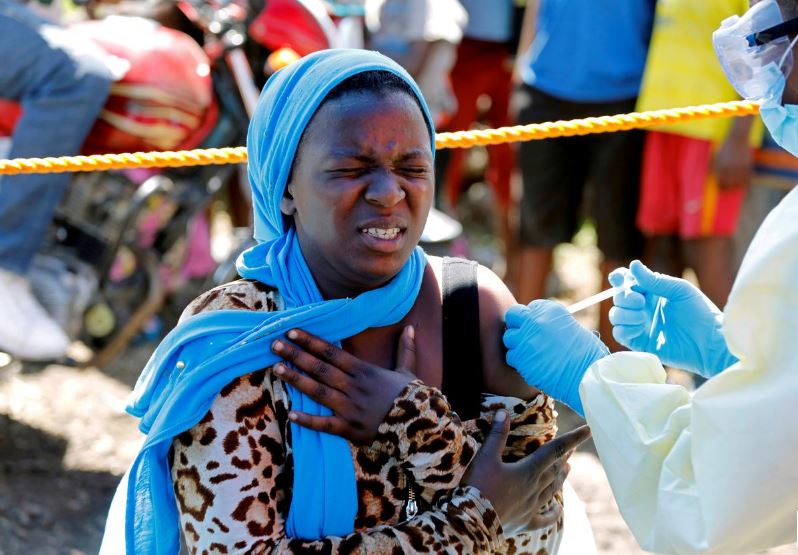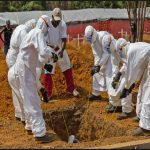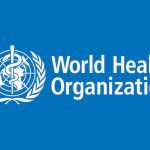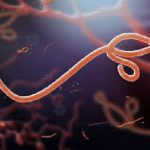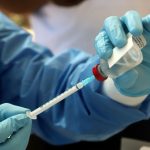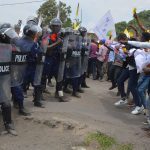The World Health Organisation has vaccinated over 1,300 people who potentially came into contact with the Ebola virus in the Congolese city of Goma, it said on Sunday, helping contain what many feared would be a rapid spread in an urban center.
A year-long Ebola outbreak in eastern Democratic Republic of Congo has killed at least 1,800, the second biggest toll ever, and efforts to contain the virus have been hobbled by militia violence and some local resistance to outside interference.
Goma, a lakeside city of nearly 2 million people on the Rwandan border, has been on high alert over the past week after a gold miner with a large family contaminated several people before dying himself.
“Ongoing vaccination activities have reached the majority (98%) of eligible contacts, and 1,314 contacts, contacts of contacts and frontline workers (have been) vaccinated to date,” the WHO said in a statement on Sunday.
No new confirmed cases have been reported in Goma since the WHO’s last report on Aug. 2.
The use of an experimental Ebola vaccine, developed by Merck, has proven to be a key weapon against the hemorrhagic fever, although reaching contacts in rural areas beset by violence has proven difficult.
The vaccine’s success has been most obvious in cities where contacts can be easier to trace, helping avoid the widespread havoc seen in densely populated areas during a 2013-2016 outbreak in West Africa that killed over 11,000 people.
The World Health Organisation has vaccinated over 1,300 people who potentially came into contact with the Ebola virus in the Congolese city of Goma, it said on Sunday, helping contain what many feared would be a rapid spread in an urban center.
A year-long Ebola outbreak in eastern Democratic Republic of Congo has killed at least 1,800, the second biggest toll ever, and efforts to contain the virus have been hobbled by militia violence and some local resistance to outside interference.
Goma, a lakeside city of nearly 2 million people on the Rwandan border, has been on high alert over the past week after a gold miner with a large family contaminated several people before dying himself.
“Ongoing vaccination activities have reached the majority (98%) of eligible contacts, and 1,314 contacts, contacts of contacts and frontline workers (have been) vaccinated to date,” the WHO said in a statement on Sunday.
No new confirmed cases have been reported in Goma since the WHO’s last report on Aug. 2.
The use of an experimental Ebola vaccine, developed by Merck, has proven to be a key weapon against the hemorrhagic fever, although reaching contacts in rural areas beset by violence has proven difficult.
The vaccine’s success has been most obvious in cities where contacts can be easier to trace, helping avoid the widespread havoc seen in densely populated areas during a 2013-2016 outbreak in West Africa that killed over 11,000 people.
The World Health Organisation has vaccinated over 1,300 people who potentially came into contact with the Ebola virus in the Congolese city of Goma, it said on Sunday, helping contain what many feared would be a rapid spread in an urban center.
A year-long Ebola outbreak in eastern Democratic Republic of Congo has killed at least 1,800, the second biggest toll ever, and efforts to contain the virus have been hobbled by militia violence and some local resistance to outside interference.
Goma, a lakeside city of nearly 2 million people on the Rwandan border, has been on high alert over the past week after a gold miner with a large family contaminated several people before dying himself.
“Ongoing vaccination activities have reached the majority (98%) of eligible contacts, and 1,314 contacts, contacts of contacts and frontline workers (have been) vaccinated to date,” the WHO said in a statement on Sunday.
No new confirmed cases have been reported in Goma since the WHO’s last report on Aug. 2.
The use of an experimental Ebola vaccine, developed by Merck, has proven to be a key weapon against the hemorrhagic fever, although reaching contacts in rural areas beset by violence has proven difficult.
The vaccine’s success has been most obvious in cities where contacts can be easier to trace, helping avoid the widespread havoc seen in densely populated areas during a 2013-2016 outbreak in West Africa that killed over 11,000 people.
The World Health Organisation has vaccinated over 1,300 people who potentially came into contact with the Ebola virus in the Congolese city of Goma, it said on Sunday, helping contain what many feared would be a rapid spread in an urban center.
A year-long Ebola outbreak in eastern Democratic Republic of Congo has killed at least 1,800, the second biggest toll ever, and efforts to contain the virus have been hobbled by militia violence and some local resistance to outside interference.
Goma, a lakeside city of nearly 2 million people on the Rwandan border, has been on high alert over the past week after a gold miner with a large family contaminated several people before dying himself.
“Ongoing vaccination activities have reached the majority (98%) of eligible contacts, and 1,314 contacts, contacts of contacts and frontline workers (have been) vaccinated to date,” the WHO said in a statement on Sunday.
No new confirmed cases have been reported in Goma since the WHO’s last report on Aug. 2.
The use of an experimental Ebola vaccine, developed by Merck, has proven to be a key weapon against the hemorrhagic fever, although reaching contacts in rural areas beset by violence has proven difficult.
The vaccine’s success has been most obvious in cities where contacts can be easier to trace, helping avoid the widespread havoc seen in densely populated areas during a 2013-2016 outbreak in West Africa that killed over 11,000 people.
The World Health Organisation has vaccinated over 1,300 people who potentially came into contact with the Ebola virus in the Congolese city of Goma, it said on Sunday, helping contain what many feared would be a rapid spread in an urban center.
A year-long Ebola outbreak in eastern Democratic Republic of Congo has killed at least 1,800, the second biggest toll ever, and efforts to contain the virus have been hobbled by militia violence and some local resistance to outside interference.
Goma, a lakeside city of nearly 2 million people on the Rwandan border, has been on high alert over the past week after a gold miner with a large family contaminated several people before dying himself.
“Ongoing vaccination activities have reached the majority (98%) of eligible contacts, and 1,314 contacts, contacts of contacts and frontline workers (have been) vaccinated to date,” the WHO said in a statement on Sunday.
No new confirmed cases have been reported in Goma since the WHO’s last report on Aug. 2.
The use of an experimental Ebola vaccine, developed by Merck, has proven to be a key weapon against the hemorrhagic fever, although reaching contacts in rural areas beset by violence has proven difficult.
The vaccine’s success has been most obvious in cities where contacts can be easier to trace, helping avoid the widespread havoc seen in densely populated areas during a 2013-2016 outbreak in West Africa that killed over 11,000 people.
The World Health Organisation has vaccinated over 1,300 people who potentially came into contact with the Ebola virus in the Congolese city of Goma, it said on Sunday, helping contain what many feared would be a rapid spread in an urban center.
A year-long Ebola outbreak in eastern Democratic Republic of Congo has killed at least 1,800, the second biggest toll ever, and efforts to contain the virus have been hobbled by militia violence and some local resistance to outside interference.
Goma, a lakeside city of nearly 2 million people on the Rwandan border, has been on high alert over the past week after a gold miner with a large family contaminated several people before dying himself.
“Ongoing vaccination activities have reached the majority (98%) of eligible contacts, and 1,314 contacts, contacts of contacts and frontline workers (have been) vaccinated to date,” the WHO said in a statement on Sunday.
No new confirmed cases have been reported in Goma since the WHO’s last report on Aug. 2.
The use of an experimental Ebola vaccine, developed by Merck, has proven to be a key weapon against the hemorrhagic fever, although reaching contacts in rural areas beset by violence has proven difficult.
The vaccine’s success has been most obvious in cities where contacts can be easier to trace, helping avoid the widespread havoc seen in densely populated areas during a 2013-2016 outbreak in West Africa that killed over 11,000 people.
The World Health Organisation has vaccinated over 1,300 people who potentially came into contact with the Ebola virus in the Congolese city of Goma, it said on Sunday, helping contain what many feared would be a rapid spread in an urban center.
A year-long Ebola outbreak in eastern Democratic Republic of Congo has killed at least 1,800, the second biggest toll ever, and efforts to contain the virus have been hobbled by militia violence and some local resistance to outside interference.
Goma, a lakeside city of nearly 2 million people on the Rwandan border, has been on high alert over the past week after a gold miner with a large family contaminated several people before dying himself.
“Ongoing vaccination activities have reached the majority (98%) of eligible contacts, and 1,314 contacts, contacts of contacts and frontline workers (have been) vaccinated to date,” the WHO said in a statement on Sunday.
No new confirmed cases have been reported in Goma since the WHO’s last report on Aug. 2.
The use of an experimental Ebola vaccine, developed by Merck, has proven to be a key weapon against the hemorrhagic fever, although reaching contacts in rural areas beset by violence has proven difficult.
The vaccine’s success has been most obvious in cities where contacts can be easier to trace, helping avoid the widespread havoc seen in densely populated areas during a 2013-2016 outbreak in West Africa that killed over 11,000 people.
The World Health Organisation has vaccinated over 1,300 people who potentially came into contact with the Ebola virus in the Congolese city of Goma, it said on Sunday, helping contain what many feared would be a rapid spread in an urban center.
A year-long Ebola outbreak in eastern Democratic Republic of Congo has killed at least 1,800, the second biggest toll ever, and efforts to contain the virus have been hobbled by militia violence and some local resistance to outside interference.
Goma, a lakeside city of nearly 2 million people on the Rwandan border, has been on high alert over the past week after a gold miner with a large family contaminated several people before dying himself.
“Ongoing vaccination activities have reached the majority (98%) of eligible contacts, and 1,314 contacts, contacts of contacts and frontline workers (have been) vaccinated to date,” the WHO said in a statement on Sunday.
No new confirmed cases have been reported in Goma since the WHO’s last report on Aug. 2.
The use of an experimental Ebola vaccine, developed by Merck, has proven to be a key weapon against the hemorrhagic fever, although reaching contacts in rural areas beset by violence has proven difficult.
The vaccine’s success has been most obvious in cities where contacts can be easier to trace, helping avoid the widespread havoc seen in densely populated areas during a 2013-2016 outbreak in West Africa that killed over 11,000 people.

